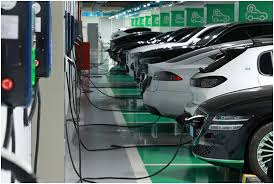Electric vehicles (EVs) are no longer just a phenomenon of the developed world. In 2023, Brazil is emerging as a leader in electric vehicle adoption among emerging markets. According to a recent report by Bloomberg Green, the Latin American giant has seen a 60% increase in EV sales from the previous year, positioning it at the forefront of sustainable mobility in the region. This trend is not only reshaping Brazil’s automotive landscape but also setting a precedent for other emerging markets. In this article, we’ll explore how Brazil is leading the charge in EV adoption, the key factors driving this growth, and what it means for the global market.
The Surge of Electric Vehicles in Brazil
Government Initiatives and Policies
Brazil’s government has been proactive in promoting electric vehicles. With initiatives like tax incentives, subsidies, and import duty reductions on EVs, the country has created a conducive environment for both manufacturers and consumers. Key policies include:
- Reduction in Import Duties: Lower tariffs on electric vehicles have made them more affordable to a broad spectrum of consumers.
- Incentives for Local Manufacturing: Policies encouraging local production have attracted global players like BYD and Volkswagen to set up manufacturing units in Brazil.
- Public Charging Infrastructure: The government has invested heavily in expanding EV charging infrastructure, with plans to install over 30,000 public charging stations by 2025.
Technological Advances and Battery Innovation
Brazil’s embrace of EV technology is also driven by advancements in battery technology. According to Battery University, improvements in lithium-ion batteries have significantly reduced costs, making EVs more accessible. In addition, local innovations in battery recycling are contributing to sustainability, further enhancing Brazil’s EV ecosystem.
- Battery Recycling Initiatives: Local companies are investing in recycling technologies to reduce waste and lower production costs.
- Improved Battery Life: Advances in battery technology have led to longer-lasting batteries, addressing one of the key concerns of potential EV buyers.
Economic and Environmental Benefits
The shift towards electric vehicles is not just an environmental move but also an economic one. The International Energy Agency (IEA) notes that Brazil’s transition to EVs could reduce the country’s dependence on imported oil, stabilizing fuel prices and benefiting the economy. Environmentally, the reduction in CO2 emissions aligns with global climate goals, making Brazil a model for sustainable development.
- Reduction in Oil Dependency: With a lower need for fossil fuels, Brazil is poised to enhance its energy security.
- Environmental Impact: A significant decrease in greenhouse gas emissions contributes to global climate change mitigation efforts.
How to Charge Your Electric Vehicle in Brazil
Charging Infrastructure and Accessibility
One of the major concerns for EV adoption is the availability of charging stations. Brazil has addressed this by rapidly expanding its network, making charging stations accessible in both urban and rural areas.
- Urban Charging: Major cities like São Paulo and Rio de Janeiro have numerous fast-charging stations, reducing charging times significantly.
- Rural Expansion: Efforts are being made to extend the charging infrastructure to rural and remote areas, ensuring nationwide coverage.
Tips for Efficient Charging
To make the most of Brazil’s charging infrastructure, consider these tips:
- Plan Your Route: Use apps to locate charging stations along your route.
- Time Your Charging: Charge during off-peak hours to benefit from lower electricity rates.
- Regular Maintenance: Keep your vehicle’s battery in optimal condition for longer life.
Where to Buy an Electric Vehicle in Brazil
Top Brands and Models
Brazil’s EV market is bustling with options from global and local manufacturers. Some of the top-selling models include:
- BYD Han: Known for its luxury features and long range.
- Volkswagen ID.4: Popular for its spacious interior and advanced technology.
- Nissan Leaf: A budget-friendly option with reliable performance.
Recommendations for Buyers
Before purchasing an EV, consider the following:
- Research Incentives: Take advantage of government subsidies and incentives.
- Compare Models: Look for models that best fit your lifestyle and budget.
- Test Drive: Experience the vehicle firsthand to understand its features and performance.
The Future of Electric Vehicles in Brazil
Emerging Trends and Innovations
As Brazil continues to lead in EV adoption, several trends are emerging that could shape the future of the market:
- Smart Charging Solutions: Integration with smart grids to optimize energy use.
- Autonomous EVs: Increased investment in autonomous vehicle technology.
- Sustainable Practices: Greater focus on sustainability throughout the EV lifecycle.
Global Implications
Brazil’s success in electric vehicle adoption sets a benchmark for other emerging markets. It demonstrates how government support, technological innovation, and consumer awareness can drive sustainable mobility. This shift not only impacts Brazil’s economy and environment but also positions the country as a leader in the global transition to electric vehicles.
In conclusion, Brazil’s leadership in EV adoption serves as an inspiration for emerging markets worldwide. As the country continues to innovate and invest in sustainable mobility, it paves the way for a cleaner, greener future. Whether you’re considering buying an EV or interested in the latest mobility trends, Brazil’s journey is one to watch. What do you think will be the next big trend in electric vehicles? Share your thoughts in the comments below.
As we look to the future, it’s clear that Brazil’s commitment to electric vehicles will have lasting impacts on both the local and global scale, driving us towards a more sustainable tomorrow.

